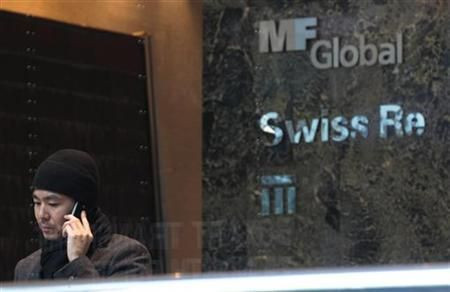Chicago's Harris Bank Plays Role in MF Global Mess

The hunt for the missing $600 million in customer money at MF Global Holdings Ltd may begin with Harris Bank, a Chicago-based lender that often holds client money for many large futures brokerage firms.
A Harris Bank branch office in downtown Chicago was the main repository for money from many of MF Global's 150,000 customers, according to customers and representatives with smaller investment firms that introduced clients to the New York-based brokerage.
Harris Bank, a division of the Bank of Montreal, is emerging as a starting point in the investigation by federal authorities, who are trying to determine what happened to more than $600 million in MF Global customer money that remains unaccounted for eight days after the firm collapsed in bankruptcy.
A person familiar with a preliminary investigation by the Federal Bureau of Investigation says one of the things authorities are looking into is what happened with the customer money held in segregated accounts at Harris Bank.
A segregated account is a separate account used by brokers to keep their customers' money separate from the firm's money.
A spokesman for Harris Bank says the bank is prohibited by confidentiality laws from discussing the customer accounts. Lawyers representing Harris Bank in the MF Global bankruptcy did not return a phone call or email seeking comment.
Kent Jarrell, a spokesman for James Giddens, the New York attorney approved by the bankruptcy court to oversee the liquidation of MF Global, said: the trustee is aware that some MF Global Inc customer funds went through Harris Bank.
Holy Grail
For years Harris Bank, in part because it is based in Chicago, has provided support services to futures brokerages, including serving as a custodian for segregated accounts.
In the futures trading business, customer money deposited in a segregated account is not meant to be used by a broker as collateral for trades made by other customers or the firm itself.
One of the issues regulators and federal authorities are trying to determine is whether the $600 million in missing customer money was inappropriately diverted from segregated accounts.
CME Group Inc , one of MF Global's four regulators, estimates that the firm has about $2.5 billion in customer segregated funds on deposit with the exchange, according to a bankruptcy filing.
Joseph Ocrant, a floor broker and commodity trading adviser with Oak Investment Group in Chicago, said money in a segregated account is not supposed to be moved without an explicit direction from a customer.
It is the holy grail of the futures industry and it is never, ever, ever to be touched, said Ocrant.
Some MF Global customers who tried to pull money out in the week leading up to the firm's bankruptcy filing received checks that would draw on an account at Harris Bank. Some of those customers received checks, even though they had put in a request for MF Global to wire the money back to them.
Many of those checks were rejected for payment when the Jon Corzine-led firm filed for bankruptcy on Oct. 31.
MF Global collapsed after a last-ditch deal to sell the firm's brokerage business fell apart over the issue of the missing customer money.
JPMorgan Marketing
Late last week it appeared some of the missing money was found in an account MF Global has with JPMorgan Chase , which provided back-office and cash management operations for the now-failed firm. But it is not clear whether any of that money constitutes the missing $600 million in customer money.
A JPMorgan spokesman was not immediately available for comment.
Brokers with several small firms that introduced customers to MF Global said they would regularly get paid commission from an MF Global account at JPMorgan.
JPMorgan has marketed its services to futures commission merchants, such as MF Global, for what it has called regulatory cash management, as permitted under Commodity Futures Trading Commission Regulation 1.25.
The rule has become a focal point of debate over whether the industry is adequately regulated. It permits customers' excess margin, or collateral for futures trades, from segregated accounts to be invested.
One marketing brochure from JPMorgan said, Your full account works for you and earns a hard dollar payment. The bank said it was a leading provider of cash-based regulatory-driven account services.
The rule was important enough to MF Global that Corzine, its former chief executive and former New Jersey governor, lobbied to stop a proposal that would have revised the rule with new limits on use of customer funds. The proposal has since been stalled.
(Reported by Matthew Goldstein, Lauren Tara LaCapra, David Henry and Jennifer Ablan in New York, additional reporting by Jonathan Spicer; edited by Edward Tobin and Matthew Lewis)
© Copyright Thomson Reuters 2024. All rights reserved.





















